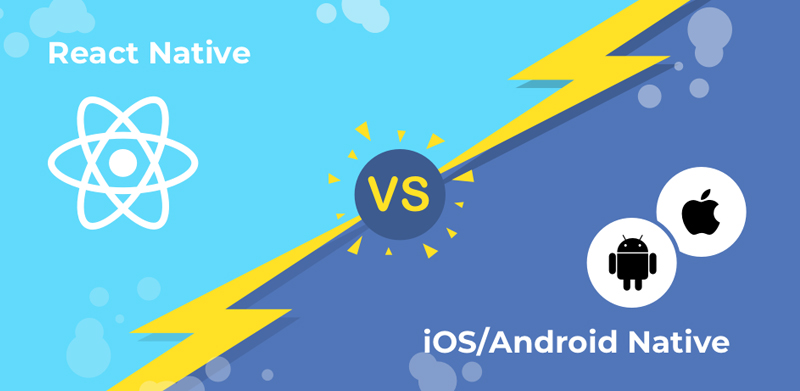React Native vs Android and iOS Native App Development
Did you know, Android users have 2.57 million apps and iOS users have 1.84 million apps to choose from? These numbers are certainly an eye-opener to how much we rely on mobile applications. Furthermore, these numbers speak of the cut-throat competition that exists in the mobile app industry as well. Imagine, the slightest delay in deploying the app might have a huge impact on your business. Likewise, a non-functional application might sabotage your reputation and will drain down all your efforts into a gutter.
In such a competitive market, getting the right product out at the right time is crucial. To ensure that app developers get things right and don’t waste enough time in creating an application, technology evolution has given React-Native App Development process. Till now, and even today, most prefer the Native app development process as, despite a bit time consuming, it gives complete control while developing an app from various platforms. React-Native, on the contrary, allows you to create cross-platform apps seamlessly. This vast choice has certainly raised a question, ‘Will React-Native app development replaces Android and iOS Native app development?
What may seem highly impossible or at the least, difficult, might happen over the period, or maybe not. Before we come to any conclusion, let’s quickly understand what these two ways are and their features.

Native App Development
The majority of consumers use either an Android or an iOS operated mobile phones. In native app development, developers will use different programming languages, like Java, Kotlin for Android and Objective-C or Swift for iOS. This is so as both the operating systems have their tools, elements, and SDK. Given a choice, most companies opt for Native app development because of its endless benefits. One of the major benefits of using native app development is the surety of the behavior and compatibility of the application.
React-Native App Development
React-Native App development is the answer to the tedious task of Native App development. This lets developers create Android and iOS mobile app through the same language. This open-source framework uses JavaScript, which was introduced by a Facebook Software Engineer, Jordan Walke. Through this, companies can cut down their expenses in hiring two developers for two different mobile software.
Benefits of Native App Development
- Amazing output – With native app development, the focus of the developer is towards the specific mobile operating system. The output if better, quick and effective as the developer has used the specific programming language to develop the app for a specific mobile operating system.
- Consistency – In native app development, developers use the defined OS defined software development kit (SDK). This helps them maintain the consistency and look and feel of the app on that particular platform. This, ultimately, leads to a better user experience due to no discrepancies between the app design and function, and OS.
- Security is ensured – When the developer uses the OS defined SDK to develop an app, the security of critical user information is ensured.
- Interactivity is Intact – When an app is developed using the native app development process, there are high chances of having the interactivity intact as per the devices’ OS interface. This also makes the app feel like a part of the mobile phone and not something that’s been downloaded.
- Having access to complete features of the device – In the native app development, one develops the app for a particular OS. They’re aware of all the features that OS offers. This lets the developer customize the app accordingly.
Benefits of React-Native app development
- Open Source DocumentReact – Native app development is an open-source document. This means it’s available to everyone within the community. So, in case, if you have difficulty at some level or are not able to solve the query, you can easily seek the help of other experts.
- Pre-built components – This is the major advantage of react-native app development. There are pre-built components that make app development simple, economical and quick. Since it’s an open-source technology, many codes are the disposal and can be used without any worry.
- Easy third-party plugin – Though, the react-native app development is at its initial stage and still has a lot of space for evolution, it allows developers to use a third-party plugin. This can be done either through the native module or JavaScript module.
- Easy & Simplified UI – Developing a mobile app through react-native technology is easy and simple through its amazing UI. Besides, the apps developed through this technology are responsive, give a smoother feel and reduces the load time.
- Modular Architecture – React-native technology uses a modular structure that makes it easy and flexible to the team of developers to easily can access each other’s projects and can make necessary updates, whenever needed.
Conclusion
In the world where the competition is getting tougher day by day, it’s important to be quick, smart, and efficient with the work. The native app development process is time-consuming and at some level, costly. To stay upbeat in the competitive market, developers have to develop an effective and fully functional mobile app as soon as possible. The react-native app development technology is the solution.
The react-native app is still in its early years. It has to go through some evolution before it can overrule the native app technology. However, when it comes to developing a cross-platform app at the most economical price as quickly as possible, developers are going to prefer react-native. For those, who still would prefer OS-based SDK for app development will opt for the native app. Would the native app be out of the market and would surrender to react-native, only time will tell.

Leave a Reply